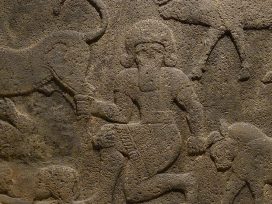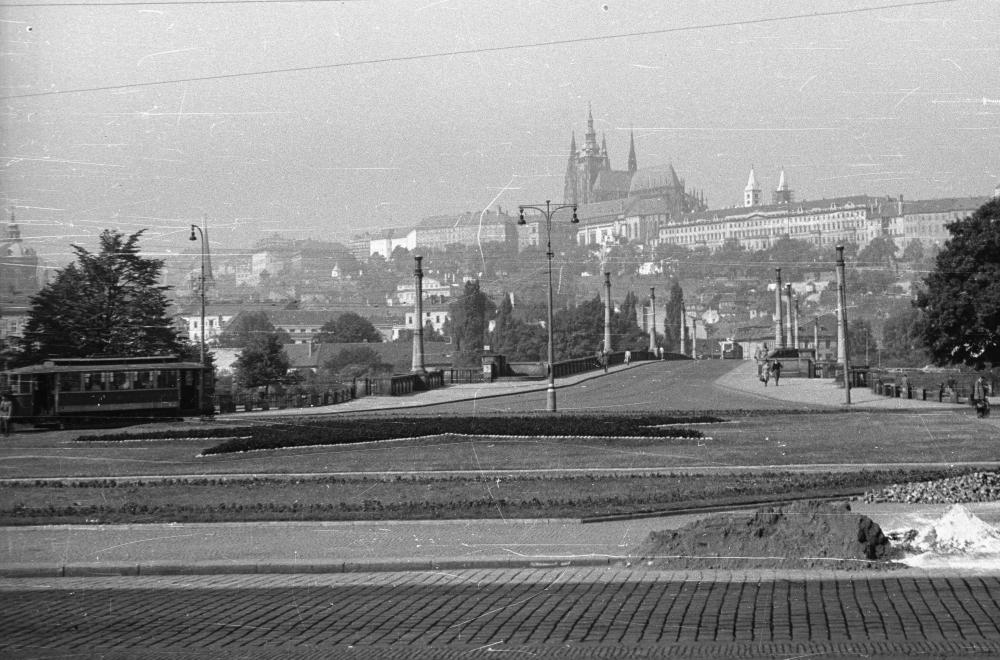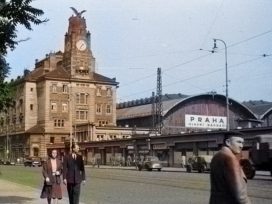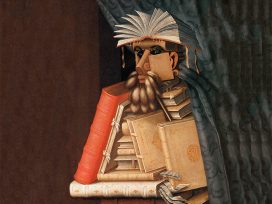After the rupture caused by World War Two, Britain began to drift further away from Europe. The Fifties and Sixties were the decades of the Movement poets in English literature, with Philip Larkin, Kingsley Amis and their Little Englandism setting the tone for their contemporaries. For a British writer of that time, there was nothing less fashionable than to dream of a European life. Yet John Berger was consumed by that dream when he left England for good in 1962, settling first in Zurich and then in the French village of Quincy, which remained his home until his death in January 2017. His move to the Continent was provoked by his detractors in England, who never missed an opportunity to attack him for his unreconstructed Marxism. But his one-way journey was also a means of fulfilling a long-held artistic aspiration: Berger went to Europe because he wanted, in his own words, ‘to become a European writer’.
It is easy to misread Berger’s sentiment today as old-fashioned Eurocentrism, and to miss out on the radical import of that word ‘become’. What was Berger aiming to achieve when he embarked on this mission to Europeanize himself? What did it mean to become a European writer in any case? Wasn’t this a function of nationality, of geopolitical identity, of personal roots? And wasn’t Berger, as a Briton, always a European writer?
But this wasn’t what he meant. The Europe Berger found himself gravitating towards was less a collective of nation states than an idea – an ideal – of shared cultural heritage which anyone could lay claim to. The European tradition, by definition multilingual and multicultural, was no easy inheritance. It was something that had to be worked towards, something you had to earn, and it entailed a sort of cultural reaching out, from the native self to the foreign other. Berger set about the task of becoming a European writer through a sustained intellectual engagement with other languages, other histories.
The Hindi writer Nirmal Verma arrived in Europe a couple of years before Berger. It was a very different Europe that Verma set up camp in: behind the Iron Curtain, in Soviet-controlled Czechoslovakia, worlds away from the economic miracle of the post-war West. Yet Prague was opening up in the ’60s. It was absorbing influences from as far afield as Hollywood (US films were being shown at local cinemas for the very first time), and it was turning into an important centre for writers, artists and scholars whose works were informed by a typically European curiosity for ‘the foreign’. Verma himself was among the beneficiaries of that fledgling cosmopolitanism. He was invited to Prague by the Oriental Institute on a fellowship programme that required him to translate novels and stories by modern Czech writers into Hindi.
Verma was no stranger to the art of literary translation. Indeed, his writing career began with a few indirect translations from English into Hindi of Russian classics – works by Leo Tolstoy, Alexander Kuprin and Alexander Fadeyev. Verma’s Russophilia is partly explained by the fact that he became a member of the Communist Party as a college student in Delhi. (He renounced the ideology after the Soviet invasion of Hungary in 1956.) But factors other than politics were also at play here.
Hindi literature has thrived on transactions across languages ever since Munshi Premchand, the tutelary father of modern Hindi writing, discovered the English translations of Rabindranath Tagore’s short stories, originally written in Bengali. (Premchand himself wrote in two languages, Hindi and Urdu.) So there was nothing out of the ordinary for an aspiring Hindi writer to be able to juggle languages, to be a voracious reader of translated texts, and to develop early on the multilingual sensibility of a translator. In his teenage years, Verma had already acquired a taste for Russian literature, having read Maxim Gorky, Anton Chekhov and others in translation. And long before he moved to Prague, he had struck up an acquaintance with the works of several Czech writers, including the poet Miroslav Holub.
Over the years Verma spent in Prague – from 1959 to 1968 – this acquaintance turned into intimacy. An intensive language course gave him a decent grounding in Czech, and he soon began translating into Hindi the writings of Karel Čapek, Bohumil Hrabal and Jan Otčenášek, among others. Two of Milan Kundera’s early stories, collected in English under the title Laughable Loves, appeared in Verma’s Hindi translation years before they or their author were introduced to the Anglophone West. Verma’s translations opened new doors for Hindi readers in India. At the same time, they played a vital role in his discovery, or rather rediscovery, of Europe.
At home in Europe
‘Unless we learn to translate European literature directly into Hindi without the mediation of English our understanding of Europe will remain extremely superficial, shallow and limited,’ Verma wrote in an essay about how Indians perceive Europe (‘Har Baarish Mein’, ‘Every time it rains’). The spectre of England, he argued in this piece, had obscured Europe for generations of Indians. On top of that, the English language’s global dominance served to further isolate the Continent from the rest of the world. Anyone looking to make a real connection with Europe had, therefore, to reject Anglocentric presumptions of all kinds, whether historical, political or cultural. For an authentically European encounter, one had to rediscover Europe. Not the monolith found in history books, but the Europe of convergences and difference celebrated by Walter Benjamin as he began translating the writings of Charles Baudelaire into German; and by Baudelaire when, struck by Wagner’s melodies, he wrote in a letter to the composer, ‘It seemed to me that this music was mine.’
Remarkably, Verma’s writings from his European years don’t convey any sense of homesickness or longing for the Indian way of life. His is not the literature of exile. As a writer in a foreign land, he rejects the emigrant’s nostalgia, channelling instead an imaginative at-homeness seldom associated with creativity. All writers are to some extent outsiders in the societies they inhabit. But Verma’s great strength was that he could write as an insider even in supposedly alien settings. Home was not a fixed idea for him; it was linked to creative possibilities, to inspiration, which could strike you anywhere.
His first novel, Ve Din (available in an English translation as Days of Longing), is set in Prague. It is possibly the first Indian novel, certainly the first Hindi novel, to be set entirely in a western city. Published in 1964, Ve Din revolves around an international ensemble of characters: four students, an Indian, a Burmese, a German and a Czech, plus a mystery visitor from Austria. The novel is a tribute to diversity, and as such is a very European novel. Its Indian narrator, who is proficient in Czech, takes up a part-time job as an interpreter and accompanies a holidaying Austrian woman on a sightseeing tour across Prague, with amorous consequences. But it is not only the narrator who is playing the interpreter; it is the author as well, for he meets us, the readers, in the domain of Hindi, at many removes from the original milieu of the story.
Like all great works of fiction, Ve Din creates an illusion of proximity rather than the alienating, journalistic perspective of distance. The cafés, streets and trams of Prague, its lampposts and shop windows, the changing light of the day are all lovingly evoked in these pages. Every detail reminds us that this indeed is a love story: about a writer’s love for a city. At one point in his guided tour, the narrator says that he feels ‘the kind of curiosity you sometimes feel when looking at your city through someone else’s eyes’. There is no ironic intent in this sentence (though the postcolonial role-reversal – an Indian regarding an Austrian as an outsider, as ‘someone else,’ within Europe – is hard to miss). It simply reconfirms the narrator’s credentials as a true local of Prague, and it conveys a sense of how completely the author had come to accept this place as his second home.
Before its near-total disappearance behind the Iron Curtain, Prague was an international city par excellence, rivaling, even outshining, Paris and Vienna. The city’s Czech name, Praha, is linked to another Czech word, prah, which means threshold; and the locals proudly flaunt this phonetic connection to emphasize the role Prague had historically played as the point of entry into Europe. This was a city that prided itself on its continental heritage, on its European identity. If you were at home in Prague, it was safe to assume that you’d be at home anywhere in Europe. That, at least, was the case with Verma, who often crossed the threshold of Prague into the vaster European landscape, embarking on a journey whenever he had enough time and money.
Journeys and departures
Verma’s travel book, Cheedon Par Chandani (‘Moonlight on pine trees’, not available in English) preceded his Ve Din by a couple of years. It was among the pioneering contributions to what was then very sparse genre of Hindi travel literature. The book includes an account of a lengthy journey Verma once made from Prague to Reykjavik, via Berlin, Paris and Edinburgh. It was a ‘great pleasure excursion’ of the Mark Twain variety, even if Verma’s sensibility as a traveller was miles away from Twain’s misanthropic (and comedic) scorn. Verma instead was guided onwards by sympathy, as much for the people as for the post-war wasteland he encountered in parts of Europe. In Berlin, for instance, he was struck by the sight of vacant buildings, once home to Jewish families. Elsewhere in the same city, he found bombed out structures, completely hollow on the inside, but with their facades still intact, like some ancient ruin.
These were glimpses of a Europe still recovering from the trauma of World War Two. It was yet to be rebuilt and was decades away from reinventing itself as the First World. Verma’s travel writings take us back to that curious interregnum in modern European history, when many things were on the verge of vanishing and many about to come into being. In 1961, when Verma first travelled to Berlin, the city was within months of becoming a symbol of divided Europe: construction work on the Berlin Wall began in August 1961. When he went to Paris around the same time, he found that the city’s bohemian spirit was still alive in the cafés and cabarets of Montmartre. And in Iceland, which in the mid-1950s had produced its only Nobel laureate to date, he found a culture that wasn’t as distant from the rest of the continent as it appears today.
During his time in Reykjavik, Verma spent a day with Halldór Laxness, the Icelandic writer who won the Nobel Prize in Literature in 1955. They talked about books and travelling; about literature and society; about Laxness’s time in India; about a dinner he was invited to in Bombay, where his hosts mistook him for Aldous Huxley. All this and more is recorded in the Laxness chapter in Cheedon Par Chandani. But beyond these anecdotes, the reader is struck by the literary range of the interview: it covers much ground, from the Icelandic sagas to Tagore’s poetry, reminding us that both Verma and Laxness espoused the sort of cultural internationalism that is now passé.
These discoveries and this degree of immersion in European culture would have been impossible for Verma had he chosen to leave Prague at the conclusion of the two-year term of his fellowship as he had initially planned. That he ended up staying for nine years is testament to his great fondness for the city and to the lasting friendships he formed there. When, in 1968, he had to relocate to England (to accompany his wife), he bade a reluctant farewell to Prague, which was soon to become the nightmare capital of Europe. Sixty-eight, of course, was the crux year in modern European history. It opened on a sanguine note. The Czechoslovakian experiment with liberal values under Soviet rule made it seem like socialism really had a human face after all. Even a hardened post-1956 anti-communist like Verma was excited by the Prague Spring. In a letter to his brother around this time, Verma wrote, ‘This is a completely new kind of revolution in Eastern Europe, where in one night all censorship is gone.’ But the political season soon took a turn for the worse, from spring to seething summer. The Soviet authorities went for overkill – a military invasion of Prague – to teach liberals a lesson. And before Verma could settle into his new life in England, tanks were being deployed at Wenceslas Square.
One of Verma’s most powerful essays is about the gathering darkness in Prague in the days leading up to the Soviet invasion. ‘Prague: A Dream’ is an account of the author’s final days in ‘the city of headlines, dangers and rumours’. There’s a general air of apprehension everywhere, even panic. Optimism survives only in the form of delusions. ‘But Hungary was different,’ an old woman tells Verma when he brings up the terrible precedent set in 1956, the Soviet invasion of Communist Hungary. If it could happen there, it could happen here, is Verma’s reasoning. He has a premonition of the coming catastrophe. Which is why all the street protests and petition-signing queues appear to him so completely futile, and for that reason so tragically heroic. A few years after the worst was over – or the worst seemed to be over to the outside world – Verma returned to Prague for a brief visit, on the pretext of attending a seminar. Meetings with old friends, who were desperately looking for a passage out of the country, left him dejected. Even more dispiriting were the reports regarding those friends and acquaintances of his who had been thrown in prison or had their whole lives ruined. Distinguished scholars he’d once known were now working as window-cleaners and taxi drivers.
‘Walking in Prague’s silent alleyways, I think to myself that I have spent the best and most decisive years of my life in this country,’ Verma wrote in the 1970s. In more ways than one, his Prague experience made him the writer he was, and possibly the person he was. The task John Berger had set for himself in 1962, Verma seemed to have accomplished after spending nearly a decade in Europe. By the time he was ready to return to India, Verma was already a European writer.
A sense of belonging
Tagore’s critics often used the tag ‘European’ in relation to his work as a putdown. (The British historian and novelist Edward John Thompson once dismissively dubbed Tagore ‘a European writer of Bengali’.) In the Hindi community, Verma’s detractors adopted the same strategy, calling him out as a European writer of Hindi. Even his admirers had reservations about what they saw as Verma’s Eurocentric streak, which needed redeeming with some India worship. At best, he was seen as someone who had lost his way before his homecoming in the mid-1970s and the prodigal-son welcome that followed.
This idea of Verma’s imaginative ‘return’ to India is to some extent true. In the second half of his career, he began a more conscious, and conscientious, exploration of Indianness, mainly through his engagement with Hindu philosophy, which some of his colleagues saw as a rank betrayal of secular principles, and through comparative cultural analyses in which India was always his central point of reference. He started writing essays that carried titles such as ‘Indian culture and the nation’, ‘The dream and responsibility of the Indian writer’, ‘What being an Indian means to me’ and so on. Verma was also developing a more India-centric understanding of Europe at this point. Indeed, he was able to detect strains of what he recognized as Indian sensibility in European thought. (Another significant postcolonial reversal, although it wasn’t politically inspired.) ‘Goethe was the last European thinker who was nearest to the world-embracing [vaishvik] sensibility of the Indian tradition, where human beings and nature, instead of being seen as two separate entities opposed to each other, inhere in one monastical consciousness,’ Verma wrote in his essay, ‘The role of an Indian intellectual’.
Not unlike the European Orientalist who heads to the East on a quest for spiritual self-discovery, Verma styled himself as an Indian Occidentalist, learning to see the self through, and in relation to, the West. In a 1988 lecture he delivered at Germany’s Heidelberg University entitled ‘India and Europe: Regions of resonance’, Verma quoted the Indian philosopher and renowned Heidegger scholar Jarava Lal Mehta on how the journey that leads us through ‘the foreign and the strange’ is the only means of rediscovering oneself. ‘It would surely be a very long journey,’ Verma said, ‘during which we would have to cross the mountainous landscape of European culture, so that eventually we reach our intended destination.’ In this sense, Europe was a stepping-stone for the Indian writer in the making. The history, the literary legacy of Europe had to be reckoned with if one wished to become an Indian writer.
John Berger was not keen on aligning himself with any particular tradition. He was in fact among his generation’s most vociferous critics of European society – of its ingrained class prejudices reinforced by its bourgeois art forms. Yet he was drawn to something dynamic, something alive in the European tradition: possibly its tendency, as Berger once wrote, to ‘break with or remake its own inheritance’ time and time again. In any case, one of the big lessons Berger imparts to us, through his writings and his philosophy of art, is that artistic traditions can be radically reconfigured, either from the inside-out, by artists pushing against conventional modes of thinking, or from the outside-in, by us, the consumers of art, if we choose to adopt different ways of seeing.
Berger’s dream of becoming a European writer was surely a product of his lifelong desire to break the shackles of tradition. To be a European writer, for Berger, was to participate in a continual shaping and reshaping of one’s own tradition. It was to rebel against the classic writerly compulsion of finding a home and settling down. The same sort of restlessness is there in the iconoclasm of the mediaeval Bhakti movement, as well as in the cool cosmopolitanism of the Bombay poets. And it is certainly there in much of Verma’s work. He was disparaged as a wannabe European by some and hailed as a born-again Indian by others. But the truth is that Verma’s writings belong to no fixed tradition, and it is in this sense that they are both authentically Indian and authentically European.









